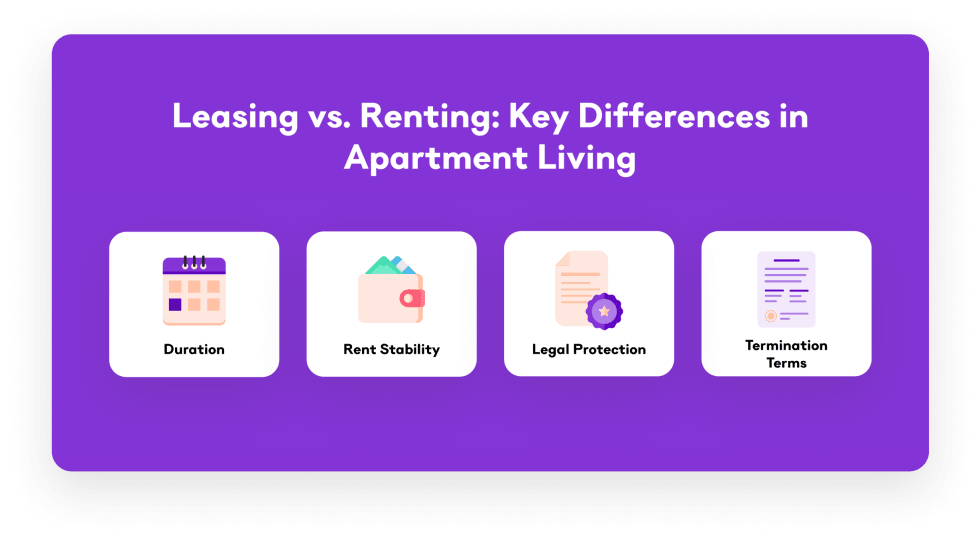- 98 units available
- 1 bed • 2 bed
- Amenities
In unit laundry, Granite counters, Hardwood floors, Dishwasher, Pet friendly, 24hr maintenance + more

In short: the difference between a lease and a rental agreement is that a lease locks things in, a rental agreement keeps things flexible.
A lease is usually a fixed-term contract—think six months or a year—where your rent and rules stay the same until it’s up. A rental agreement? That’s the month-to-month version, rolling over until someone gives notice.
Knowing the difference helps you decide what matters more right now—stability or freedom to move. A lease can shield you from rent hikes and guarantee your spot, while a rental agreement makes it easier to change course if life does.
People often use “lease” and “rent” like they mean the same thing, but they’re not twins. We’re talking about how these play out in the real world of apartments, condos, and townhouses—not cars or RVs.
A lease agreement is your long-term rental contract—six months, a year, sometimes even longer. Once signed, your rent, rules, and included perks (utilities, parking, etc.) are set in stone until the lease is over—unless you and your landlord agree to change them in writing.
Why renters choose leases:
Breaking a lease early usually means penalties—fees, lost deposits, or both. So if you’re thinking about a big life change soon, a lease can feel more like a ball and chain than a safety net.
A rental agreement is short-term, often renewing every month automatically. Sort of like a month-to-month gym membership—you can leave when you want, but prices might change. As long as you or your landlord give proper notice (often 30 days), you can move on without penalty.
Why renters choose rental agreements:
That same flexibility goes both ways, however. Your landlord can also raise rent or change rules at each renewal—so it’s less stable.
In both cases, you’ll sign something that spells out:
Both protect you and the landlord, give you a paper trail if issues come up, and set expectations from day one.
Pro tip: Always check which utilities are included. “All bills paid” apartments exist, but sometimes “included” really means just water.

The big split comes down to commitment and flexibility. Leases lock you into a set rent and rules for the full term—usually six months or a year—which is great for stability but tricky (and sometimes costly) to break. Many landlords only offer one-year leases, but in high-demand cities like New York, renters sometimes negotiate two-year terms. In those cases, the landlord may still raise rent after year one if it’s written into the agreement.
Rental agreements work on a shorter cycle, often month-to-month, so you can make changes or move with far less hassle. Sometimes they cover a set period instead—for example, if you join a roommate mid-lease, the landlord might give you a rental agreement to finish out the term. When it’s over, they could offer you and your roommate a brand-new lease. The flexibility works both ways, though: landlords can adjust rent or rules at the end of each term, so it’s less predictable but easier to pivot if life changes.
Where you live changes the rules—like how much notice is required for rent increases or if leases can automatically roll into month-to-month.
Some states require 60 days’ notice for big changes, others just 30. A quick check of your local landlord-tenant laws before signing can save you from ugly surprises later.
Lease vs. rent agreement—it’s a choice that can shape your next move. Both lock in a place to live, but the details can make all the difference. Here’s the real talk on what you’re signing up for, so you can match with the right contract for your life right now.
A lease is like your apartment’s handshake deal to keep things steady. Your rent stays predictable, your terms don’t change mid-year, and you can settle in without worrying about sudden move-out notices. If you’re ready to stay put for 12 months or more, a lease is your ticket to stability—and usually, zero surprise rent hikes during that time.
The flip side? Leases don’t flex. Break it early and you could be looking at fees, legal headaches, or both. If you’re chasing a new job across the country or thinking of testing out that digital nomad dream, a lease can feel more like a lock than a safety net.

A rental agreement is the definition of “keep your options open.” Month-to-month terms mean you can move with just 30 days’ notice—perfect if your plans (or your job) are a little TBD. Want to test-drive a neighborhood before committing? Need a furnished spot while you save for your dream setup? Renting’s short-term flexibility has you covered. Plus, in slow rental seasons, you might even score a better rate when you renew.
The trade-off is less stability. Your rent can change more often, and your landlord can decide not to renew when your term’s up. You might also pay more overall—short-term convenience often comes at a premium. And if rental prices jump, you’re negotiating from scratch every few months.

The right fit comes down to your budget, your plans, and how much you want to keep your options open.
If you’re all about stability—think steady rent, no mid-year surprises, and the comfort of knowing you can truly settle in—a lease is your best match. It locks in your rate and keeps your living situation steady for 12 months or more.
If your life’s a little more in motion—maybe you’re a student, a contractor, or just not ready to commit—go with a rental agreement. Month-to-month terms mean you can pack up with just 30 days’ notice. It’s flexibility without the long-term strings.
Bottom line:
No matter which you pick, read every line before you sign. Ask questions. And remember—the right agreement should fit your life, not force your life to fit the contract.
Lease or rental agreement, Apartment List skips the mindless scrolling and sends you straight to your best options. Tell us your must-haves, and our matching tech does the rest. Take the Apartment List quiz to start your search for your perfect apartment. With us, you’ll spend five minutes and save 50 hours searching.
A lease is a fixed-term contract—usually six months or a year—where your rent and rules are locked in. A rental agreement is typically month-to-month, which means more flexibility but also more frequent changes.
With a lease, not without both sides agreeing in writing. Rental agreements are more flexible—your landlord can make updates (like rent or policies) at the end of each term, usually with 30 days’ notice.
It’s the no-strings-attached option of renting. Your agreement renews every month automatically, and either side can end it with proper notice.
Because you’re signing a legally binding contract that spells out your rent, responsibilities, and rights for the whole term. Once you sign, you’re on the hook—so know what you’re agreeing to.
Often, yes. Many leases roll into a month-to-month setup if you stay past your original term and your landlord’s cool with it.
Leasing wins if you want long-term stability and consistent rent. Renting month-to-month is better if you want freedom to move or adjust quickly. The right pick depends on your plans, budget, and how much you hate (or love) moving.
A lease is just one type of contract—specifically for renting property. A contract can be any legally binding agreement between people or parties.
Usually, only if both you and your landlord agree, or if your state makes exceptions for things like unsafe living conditions or military service. Otherwise, breaking a lease can mean fees, lost deposits, or paying rent until they find a new tenant.



In unit laundry, Granite counters, Hardwood floors, Dishwasher, Pet friendly, 24hr maintenance + more
In unit laundry, Hardwood floors, Dishwasher, 24hr maintenance, Stainless steel, Walk in closets + more